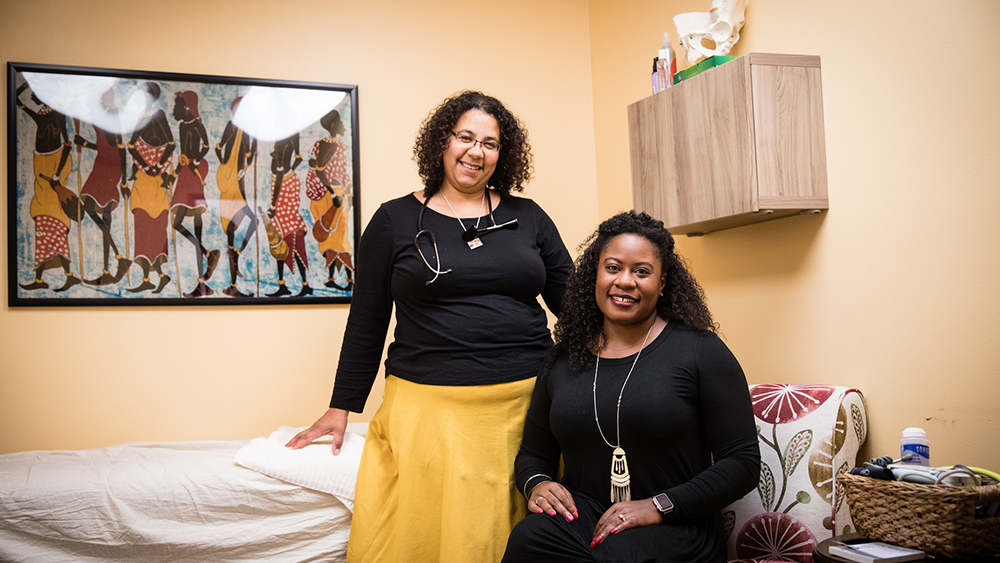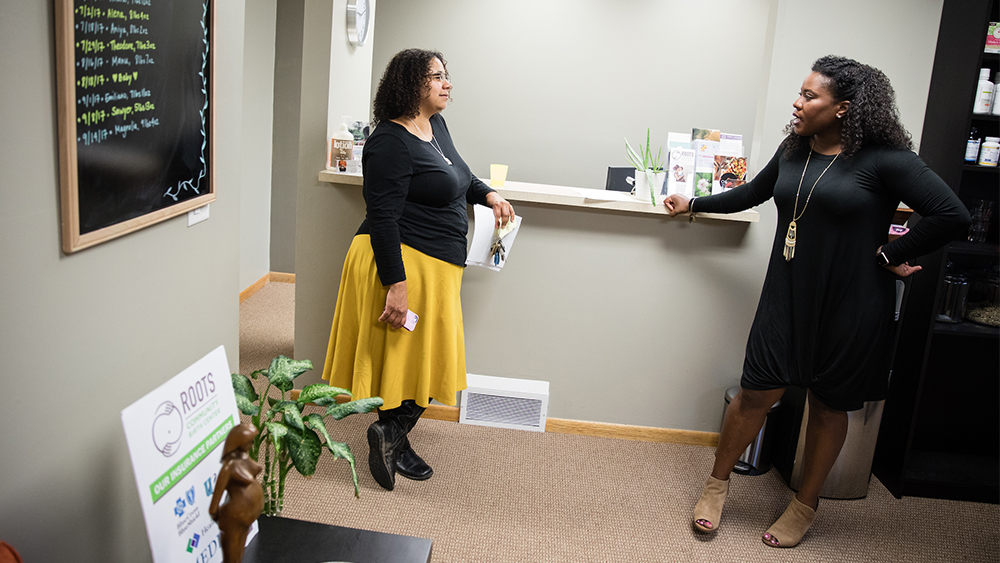
At Roots Community Birth Center, Dr. Hardeman (right) works with director Rebecca Polston to address racial disparities in maternal and infant health. Photo courtesy of University of Minnesota School of Public Health.

At Roots Community Birth Center, Dr. Hardeman (right) works with director Rebecca Polston to address racial disparities in maternal and infant health. Photo courtesy of University of Minnesota School of Public Health.
What you need to know
The COVID-19 pandemic has highlighted the role of structural racism in shaping public health. In the United States, structural racism can shape many aspects of life in Black communities, including income, education, and the criminal justice system.
A new study in Minneapolis supported by the Eunice Kennedy Shriver National Institute of Child Health and Human Development (NICHD) is examining how police violence — one form of structural racism — and COVID-19 have affected the health of Black mothers and babies during the pandemic. The study is being conducted by Rachel Hardeman, Ph.D., a University of Minnesota reproductive health equity researcher who grew up eight blocks from where George Floyd was killed.
Why are researchers studying how police violence and COVID-19 intersect to affect Black mothers?
The health of mothers and babies is a critical indicator of overall community wellbeing. In the United States, Black women are three to four times more likely to die from pregnancy-related complications than White women are. And Black babies are more than twice as likely to die as White babies are.
Hardeman began to look at the link between these statistics and police violence after a troubling observation in 2016, when she learned that Black parents were hesitant to find out the sex of their unborn children. Conversations revealed an alarming connection to police violence, which overwhelmingly affects boys and men: Black parents were nervous about having baby boys.
Hardeman’s research has shown that in neighborhoods with heavy police presence, more babies are born preterm than in neighborhoods without a lot of police contact. Additional evidence shows that police brutality and aggressive policing can be traumatizing for entire communities, resulting in harmful stress. Stress can raise a person’s blood pressure, increase stress hormones, and weaken the immune system in ways that can put parents and babies in those communities at risk.
After the killing of George Floyd, Hardeman applied for supplemental funding from NICHD to understand how COVID-19 could compound the effects of police violence on Black mothers. COVID-19 has been stressful and traumatizing for Black people, who have borne a disproportionate burden of SARS-CoV-2 disease, hospitalization, and death. Hardeman explains that police violence and COVID-19 are dual pandemics in Black communities, jeopardizing the health of Black mothers and babies.

Dr. Hardeman and Ms. Polston converse at Roots Community Birth Center. Photo courtesy of University of Minnesota School of Public Health.

Dr. Hardeman and Ms. Polston converse at Roots Community Birth Center. Photo courtesy of University of Minnesota School of Public Health.
What are the researchers doing?
Hardeman and her team are linking nationwide data about violent police encounters with birth records to assess whether incidents of police violence across the United States are associated with greater risk of pre-term birth and low birth weight among Black women. They are examining what Hardeman calls “the George Floyd effect” — whether conception or birth near the location of a traumatic killing and subsequent unrest affects the health of newborn babies.
Hardeman is also examining how the exposure of pregnant women to police violence intersects with the COVID-19 pandemic in affecting birth outcomes. She is using surveys that ask respondents to report the stress they are feeling from the pandemic — including their own illness, sickness of a loved one, or economic fallout of the pandemic — and from witnessing, experiencing, or being close to police violence. Respondents are asked to report pregnancy complications, maternal health issues, and the health of their newborns.
In-depth interviews with more than two dozen Black women from the community where Floyd was killed are providing valuable insights into how COVID-19 and the highly publicized death of Floyd have affected their lives, their health, and the health of their babies.
Why is this research important?
The health of mothers and babies can shed light on how the stress of the COVID-19 pandemic and the concurrent challenge of police violence have played out in the lives of Black people. Hardeman hopes the results of her study will improve understanding of how the pandemic, police violence, and structural racism are contributing to inequities in the health of Black mothers and babies and highlight issues that require immediate attention and reform. Her ultimate goal is to close the racial gap in birth outcomes. “This is about a healthy start to life,” she said.
Where can I go to learn more?
Racism, Violence, COVID-19, and Public Health
-
The National Institute of Mental Health has funded research on converging health threats to Black communities.
Community Events and Pathways to Inequities in Birth Outcomes
-
Learn more about Hardeman's study on NIH RePORTER.
Anti-Black Violence Is Associated with Poor Mental Health for Black Americans
-
The National Institute on Minority Health and Health Disparities (NIMHD) supported a study finding that anti-Black violence is linked to poor mental health for Black Americans.
Accelerating Research to Prevent Maternal Morbidity and Mortality (MMM)
-
An initiative from NICHD supports research to reduce preventable causes of maternal deaths and improve health for women before, during, and after pregnancy.
Sources
American Medical Association. (2020). AMA Policy Recognizes Police Brutality as Product of Structural Racism. Retrieved from https://www.ama-assn.org/press-center/press-releases/ama-policy-recognizes-police-brutality-product-structural-racism
Artiga, S., Pham, O., Orgera, K., & Ranji, U. (2020). Racial Disparities in Maternal and Infant Health: An Overview. Kaiser Family Foundation. Retrieved from https://www.kff.org/report-section/racial-disparities-in-maternal-and-infant-health-an-overview-issue-brief/
Bor, J., Venkataramani, A. S., Williams, D. R., & Tsai, A. C. Police killings and their spillover effects on the mental health of black Americans: a population-based, quasi-experimental study. The Lancet, 392(10144), 302–310. https://doi.org/10.1016%2FS0140-6736(18)31130-9
Hardeman, R. R., Chantarat, T, Smith, M. L., Karbeah, J., Van Riper, D. C., & Mendez, D. D. (2021). Association of residence in high-police contact neighborhoods with preterm birth among Black and White individuals in Minneapolis. JAMA Network Open, 4(12), e2130290. https://doi.org/10.1001/jamanetworkopen.2021.30290
U.S. Commission on Civil Rights. (2021). Racial Disparities in Maternal Health. Retrieved from https://www.usccr.gov/files/2021/09-15-Racial-Disparities-in-Maternal-Health.pdf

News and Stories
Read stories about the efforts underway to prevent, detect, and treat COVID-19 and its effects on our health.
 An official website of the United States government
An official website of the United States government

